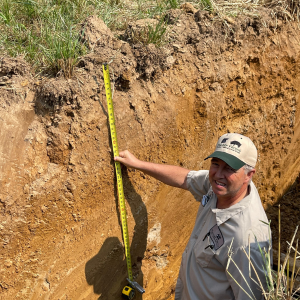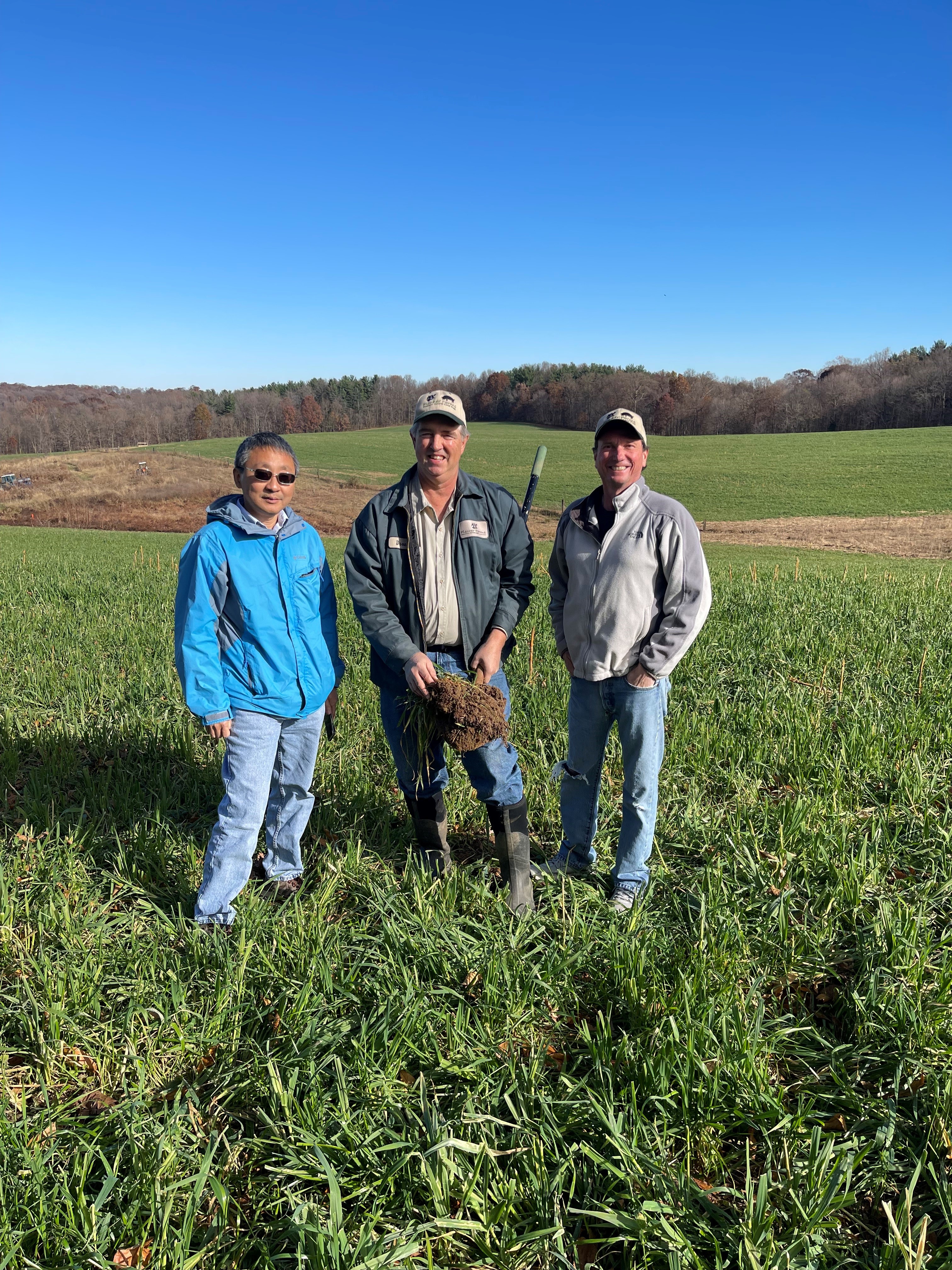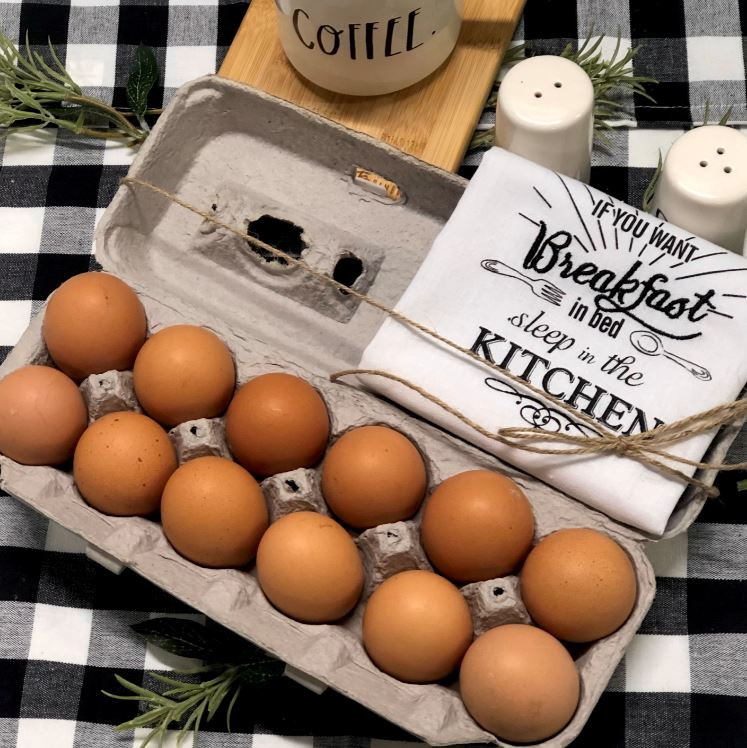In late 2023, Science and the World Resources Institute concluded that achieving the global warming objectives of the Paris Agreement would only be possible with significant reductions in emissions from food and agriculture. Because food is a vital component of our business and represents a substantial piece of our environmental impact, sourcing from local, sustainable providers is critical. Partnerships with regenerative farms like Fischer Farms in Indiana allow us to explore ways to help mitigate climate change and boost ecosystem health and resilience—all while providing delicious, top-quality beef and other homegrown products.
Sustainability in Action
 Fischer Farms has operated in the Southern Indiana area for almost 20 years, supplying fresh, natural beef that comes with a clear environmental conscience. "Our farms have been in the family for six generations," Joseph Fischer explained. "We did things the conventional way for a while, and then my dad decided he didn't want to raise 'conventional' beef.'"
Fischer Farms has operated in the Southern Indiana area for almost 20 years, supplying fresh, natural beef that comes with a clear environmental conscience. "Our farms have been in the family for six generations," Joseph Fischer explained. "We did things the conventional way for a while, and then my dad decided he didn't want to raise 'conventional' beef.'"
"We kind of stumbled into sustainability," Joseph said. "We started doing things to maximize yields in our fields and realized we were having a tremendous impact on our soil. Then it became this passion of ours to learn how we could continue to push the envelope and use cattle farming and responsible regenerative agriculture to play a role in reversing climate change."
Fischer Farms embraces regenerative agriculture, farming, and grazing practices that reverse climate change by rebuilding soil organic matter and restoring degraded soil biodiversity. These practices mean the crops at Fischer Farms capture and store more carbon dioxide than old-growth forests, contributing to carbon drawdown and climate change mitigation.
 By implementing tactics such as continuous root growth and year-round ground coverage, the Farm has increased crop yields, enhanced crop utilization, and fostered vibrant soil ecosystems. The Farm's practice of avoiding harmful chemicals also provides a thriving ecosystem for worms, insects, and other beneficial organisms, resulting in readily available nutrients for plant growth.
By implementing tactics such as continuous root growth and year-round ground coverage, the Farm has increased crop yields, enhanced crop utilization, and fostered vibrant soil ecosystems. The Farm's practice of avoiding harmful chemicals also provides a thriving ecosystem for worms, insects, and other beneficial organisms, resulting in readily available nutrients for plant growth.
The Fischer family constantly looks for ways to push the limits of regenerative agriculture's positive impacts. "My dad takes soil classes in his spare time. The kids like to give him a hard time," Joseph admitted. As word spreads about their incredible results, the Farm has partnered with universities and other experts subject matter experts. "The University of Kentucky came in to help us understand what was happening below the surface, showing us that we tripled our topsoil from three to over nine inches in seven years. That was unheard of."
In 2021, the USDA announced incentive opportunities for farms that raise commodities in a more climate-smart way. Fischer Farms was chosen to contribute to research on carbon sequestration and greenhouse gas emissions in beef production systems. The findings of this research will be used to inform future business decisions and to create science-based marketing tools that enable buyers to make climate-positive choices when purchasing and consuming food. "We're happy to play our part in this, but we also want everybody to be able to do this. There's so much opportunity out there."
Happy, Healthy Cows
"Our goal is to have happy, healthy cows every day of their life," said Joseph. The Farm keeps calves with their mothers to promote natural behavior and reduce stress early in their lives. They also utilize dry, open-air barns and follow a regimented vaccine schedule, prioritizing disease prevention. The Fischers work with the Antibiotic Resistance Action Center to discuss opportunities to reduce antibiotic use in cattle and slow down the resistance bacteria are developing to human antibiotics.
Agriculture is responsible for 10 percent of greenhouse gas emissions in the U.S., and half of that comes from cows and other ruminant animals as they digest grass and hay. Fischer Farms has actively reduced the methane emissions of their cattle by adding kelp to their diet, which inhibits an enzyme in the cow's digestive system that contributes to methane production. Through rotational grazing, direct application of manure, and sourcing clean water from an upstream pond with minimal runoff, they've enhanced soil fertility, increased carbon sequestration, and ensured a quality, fresh water supply for their cattle.
Fostering Local Partnerships
 As they sold to more chefs, they started receiving requests for more products. To facilitate making local, sustainable food available to everyone, Fischer Farms grew into a mini-hub, handling the logistics for other farms and other producers so local restaurants can place one order on the same truck and same invoice. "It's a great opportunity because these smaller producers may not have a sales team and a driver and invoicing system to get their products from Chicago, Louisville, or Cincinnati."
As they sold to more chefs, they started receiving requests for more products. To facilitate making local, sustainable food available to everyone, Fischer Farms grew into a mini-hub, handling the logistics for other farms and other producers so local restaurants can place one order on the same truck and same invoice. "It's a great opportunity because these smaller producers may not have a sales team and a driver and invoicing system to get their products from Chicago, Louisville, or Cincinnati."
"Our partners have seen growth that wouldn't exist without the restaurants, chefs, and Sodexo Live! we partner with."
A local Amish family, Lambright Amish Family Farm, provides weekly shipments of fresh eggs, maple syrup, sorghum, hickory syrup, and seasonal produce. "We started picking up eggs every week and it's grown from there. We communicate with them via handwritten letters, and it's been fantastic to grow with them and their 14 kids." The Lambrights never imagined that their reach would expand to such an extent. "The Indianapolis Colts eat eggs from this Amish community, who has never seen a game before. They have no idea who the Colts are, but they're pleased to have all those eggs going out the door every everyday to them!"
Fischer Farms at the Zoo
In 2022, Fischer Farms began supplying farm-fresh beef to the Indianapolis Zoo. "The Zoo and Sodexo Live! are focused on finding local sustainable solutions, and the more we talked, the more we saw this as a really cool fit."
In addition to providing ground beef for the Zoo's famous Smash Burgers, the Farm provides beef for private event catering. "The Zoo does a lot of really cool events, and we've been able to partner with them on their menu items. When Chef Ed has an idea, we can make it happen."
The collaboration between Sodexo Live! and Fischer Farms is an excellent example of how waste reduction practices can be effectively implemented. "When you're selling meat, you have to sell every part. What keeps me up at night is making sure I'm selling all the ground beef to go with all the steaks. Sodexo Live! introducing our burgers at the Zoo helps me have more balance in our product mix. Having that consistent and stable business during the summer months is also tremendously helpful for our growth."
